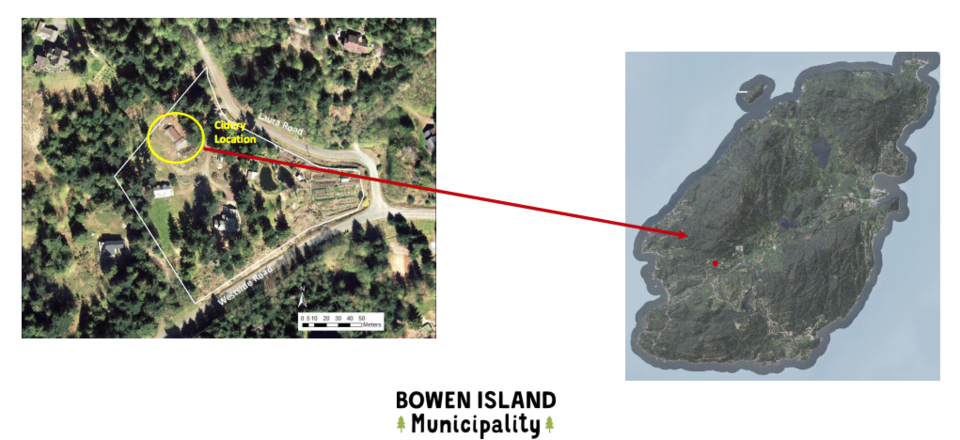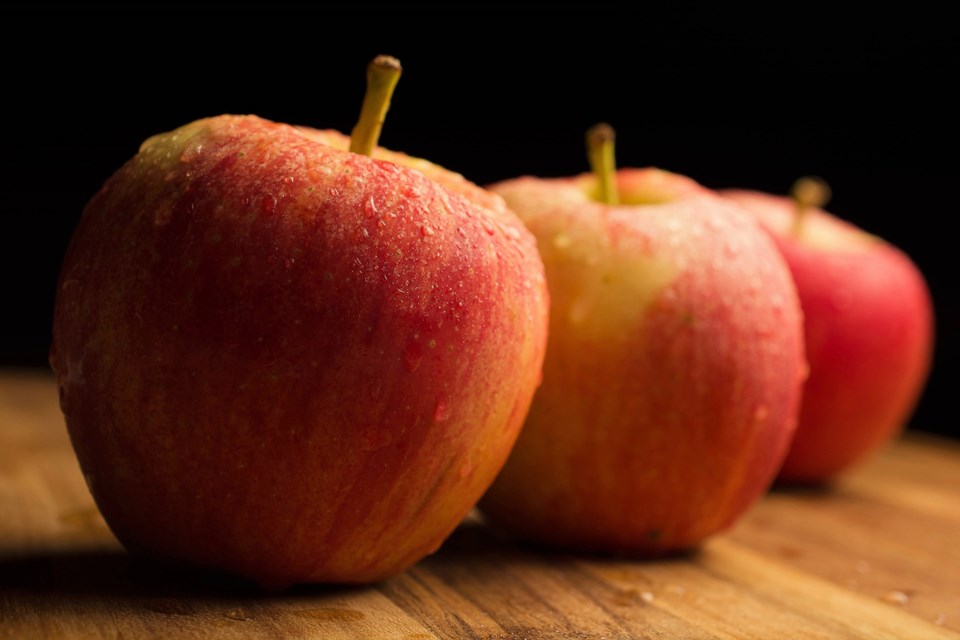Correction: The print version of this article stated the incorrect opening hours allowed under the TUP – the allowed opening hours were reduced to 11 a.m. to 7 p.m. We apologize for the mistake.
The cider will flow in West Bowen.
Bowen Island Municipality Council unanimously voted to issue a temporary use permit allowing “cidery” as a permitted use at the corner of Laura and Westside Roads – “Rileys’ Orchard” at its regular council meeting March 22.
The Rural Residential 2 zoning of the five-acre property allows agriculture as a principal use, including the “processing and sale of products harvested, reared or produced on that lot” but the definition specifically excludes “intensive agriculture, horticulture and vineyard” while making no mention of cidery. This TUP introduces the cidery definition along the lines of winery and allows the use on the property. It also allows owners Rob Purdy and Christine Hardie to supplement the apples produced from their trees with other B.C. apples (up to 75 per cent).
 Location of a proposed cidery at the intersection of Laura and Westside Roads. By Bowen Island Municipality
Location of a proposed cidery at the intersection of Laura and Westside Roads. By Bowen Island Municipality
Conditions imposed through the permit include limiting retail and patio space, requiring three parking spaces, restricting hours to 11 a.m. to 7 p.m. and prohibiting a lounge endorsement.
The applicants say they plan for initial opening hours of Thursday through Sunday noon to 4 p.m.
The TUP, valid for three years, is to prove the viability of the business, indicated BIM staff. Should the cidery prove workable, Purdy and Hardie intend to apply for a rezoning.
Despite council’s unanimity, the permit was divisive.
As of Friday afternoon, BIM had received 110 letters about this application including 72 in favour and 33 opposed, said manager of planning and development Daniel Martin. From respondents living on properties within 300 metres of the orchard, there were seven letters in support and six in opposition, he said.
Opposition had a few themes. In a similar vein to the Island Discovery Learning Community TUP application in Deep Bay in early 2020, many took issue with using a “temporary” work around the land use bylaw for a use that’s apparently going to be long term.
While a rezoning can take two years of consultations, reports and reviews, a TUP can pass over the course of two council meetings. Some also took issue with the short notice period for comment – a letter from some nearby property owners said some had five business days’ notice to have submissions included in the planner’s report. The letter requested that the TUP be denied and a rezoning be submitted instead.
Concerns of increased tourism and traffic to the property – seven kilometres from the ferry dock – with feared effects on a nearby equestrian business, neighbourhood character and use of the nearby Mount Gardner trails too factored into the opposition. As did concerns about water use and waste water (Purdy says they’re working with VCH) and environmental effects.
Council, on the other hand, emphasized that this is a means to protect the 1,200 tree orchard with more than 800 apple varieties. “The orchard itself is almost like a national treasure,” said Mayor Gary Ander. “It is very unique.”
Coun. Sue Ellen Fast pointed to another apple orchard on Cortes Island that “blinked out” after family circumstances changed.
“I think of it as a gene bank,” said Fast. “A living collection of trees. And as we head into a climate that won’t be as stable for agriculture, I think it’s even more important to have.”
While she ultimately supported the TUP (which council amended to restrict space to what’s being used now – no expansion) Fast spoke in support of sending the permit back to staff and working through the concerns of scale, environment and neighbourhood division. “I’m reluctant for council to get involved in a neighbour dispute,” she said. “I think there could be lots of common ground if they have a chance to find it.”
Fast suggested that BIM may need to revise its TUP process and that she’d bring something forward in the future.
“The issue has come down to…this misunderstanding around the scale,” said Coun. David Hocking. “It’s all tiny. There’s a tiny little patio, there’s a tiny little tasting room, there will be no food served, there will be no washrooms, so nobody’s going to be staying very late and making a racket. It’s the kind of thing that fits in perfectly to that little neighborhood.”
Coun. Maureen Nicholson said that it seems reasonable to her to propose a cidery to maintain the heritage orchard, something which requires a lot of labour. Nicholson also pointed to alignment between the cidery and the Official Community Plan’s economic development goals. Among them, “We will promote economic activity that builds on diversity, sustainability, innovation, and creativity,” she said. “I think this particular proposal ticks all those boxes.”
Coun. Michael Kaile brought up that this a highly regulated business (regulated through the liquor board). He also hearkened to his work on the Bowen branding exercise, looking at what was “quintessentially Bowen.” “To me, this very special enterprise, this remarkable…legacy is one of those businesses that does define us,” he said.
Coun. Rob Wynen commented that having a TUP means BIM has some control over what happens and testing out what works rather than the more permanent rezoning. Coun. Morse similarly said that TUPs “are an ideal way to see if the business will work,” and how it’ll work with council-imposed conditions, pointing to the cannabis shop as an example.
Martin clarified that if the conditions laid out in the TUP aren’t being met, it could be cancelled, or, the business licence pulled.
Editor’s note: Coverage of the rest of March 22 meeting: a sweeping regulatory bylaw (which regulates camping, fireworks and other use of public spaces) that passed first reading; water districts’ progress updates and the possibility of a new modular building on the community school property for Bowen Children’s Centre’s after school program, will come next week. I ran out of space.



